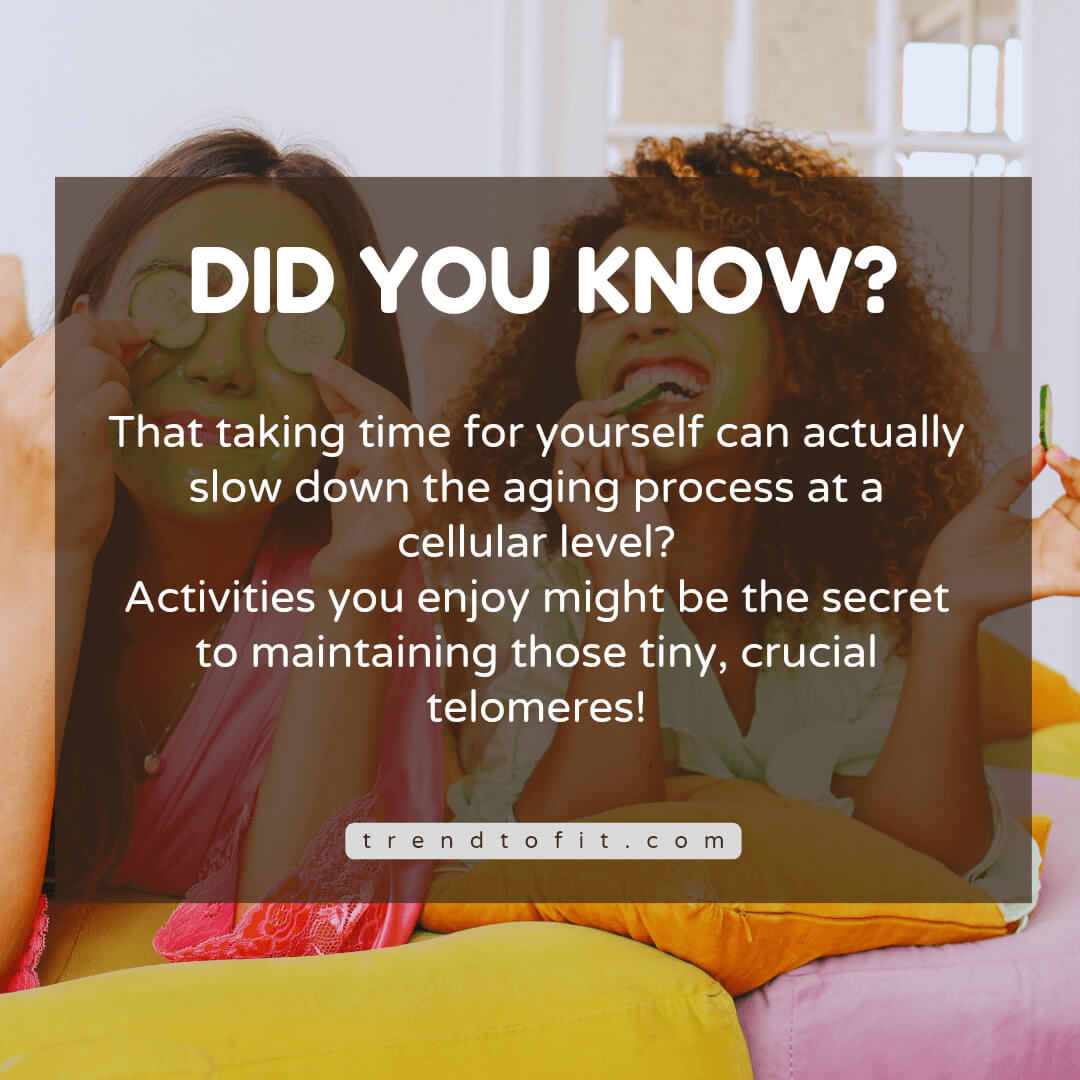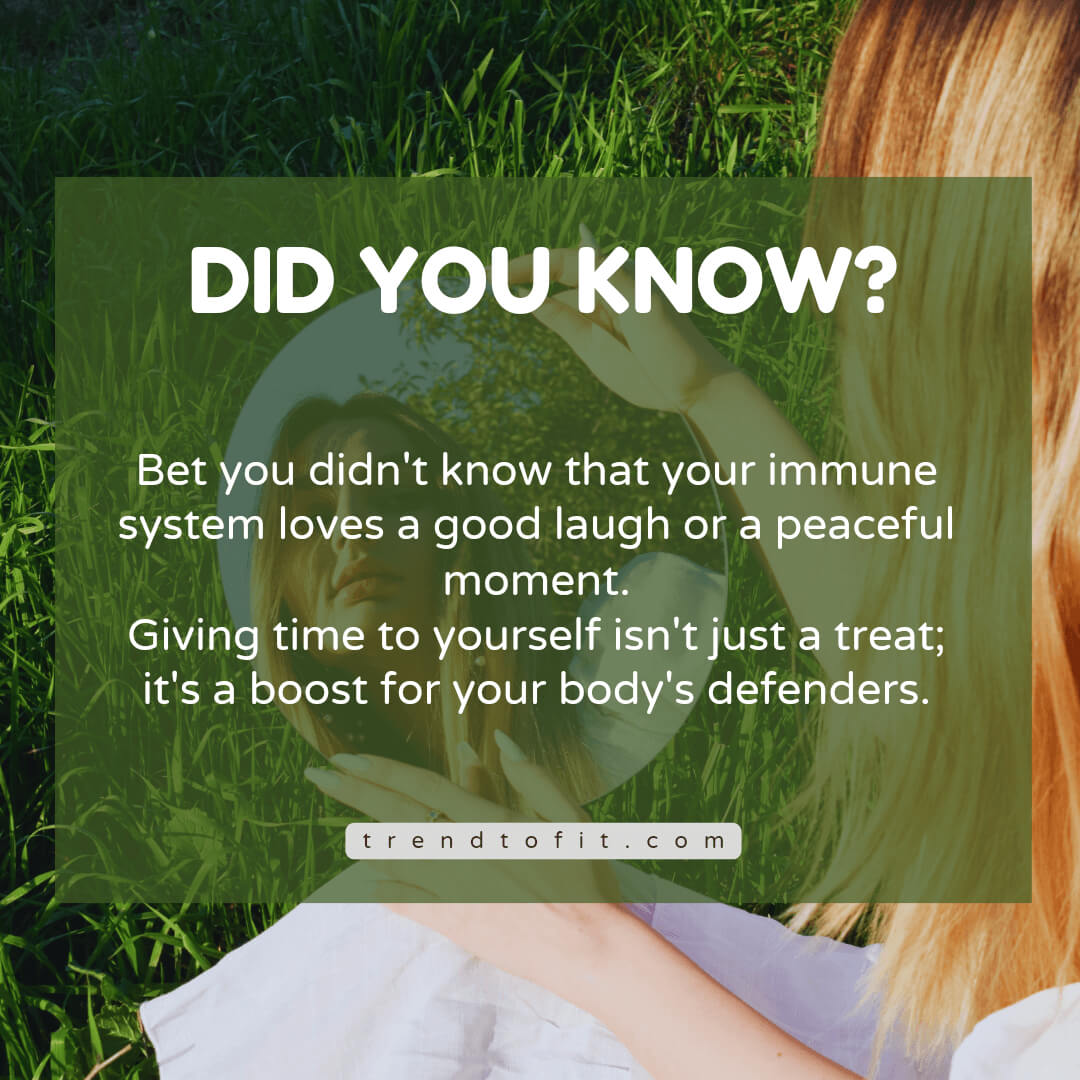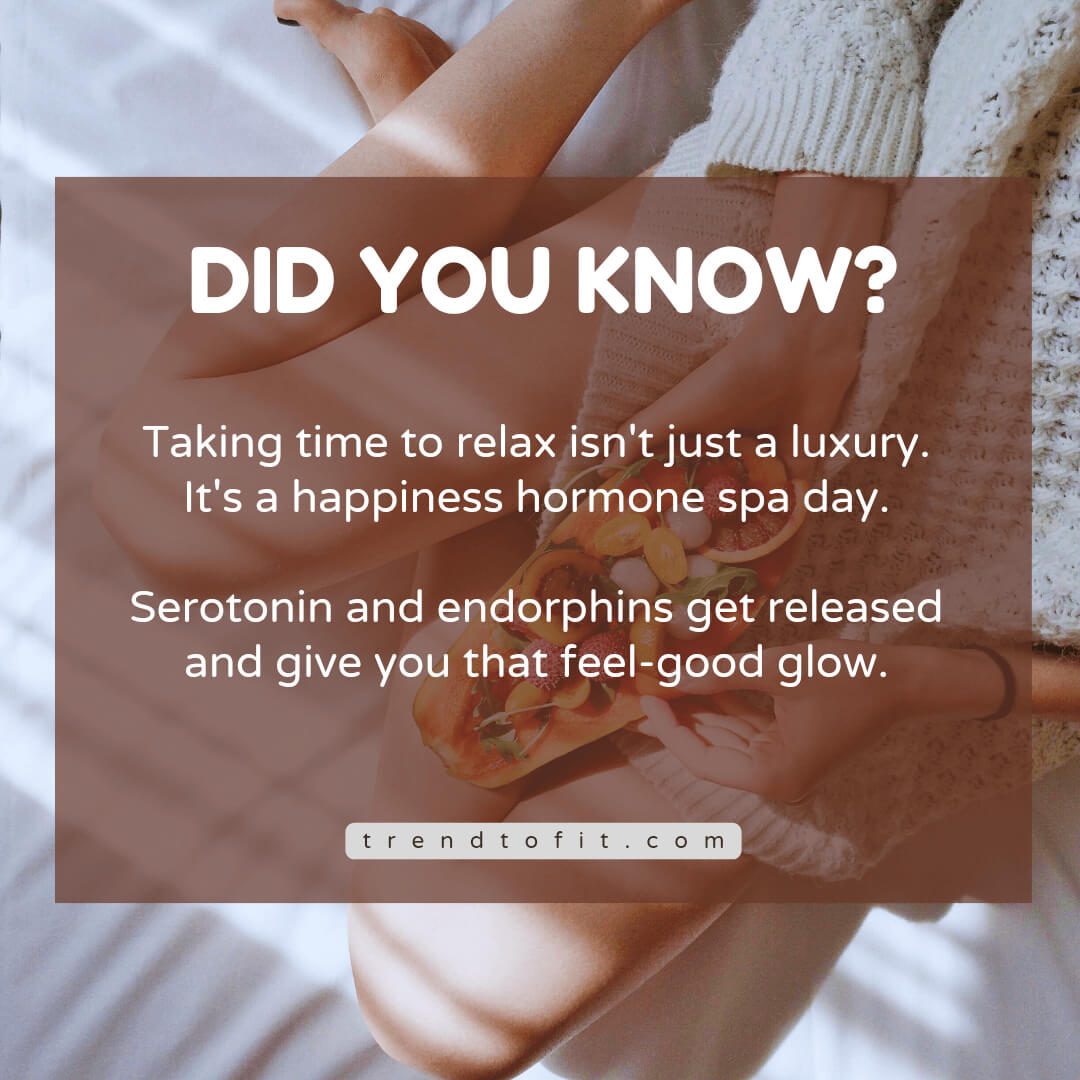Stuck with your hectic routine? When was the last time you did something just for you, not for your family or work? And, are you planning to give time to yourself, plan a self-care routine, and have self-talk sessions?
Most of you would answer like this: “Actually, it is a busy month.” Or I am focusing more on my future” and so on. But the fact is life will keep moving on and your phrases are never going to change.
So, what to do? It’s time to create that space for yourself, starting now.
Surprising Things Happen When You Give Time To Yourself
Scientific facts & benefits that would encourage you to make time for yourself more often (1) (2).
1. Telomeres & Stress Reduction
Did you know that taking time for yourself can slow down the ageing process at a cellular level? Activities you enjoy might be the secret to maintaining those tiny, crucial telomeres!
Helpful:
2. Neuroplasticity & Learning
Ever heard that picking up a new hobby isn’t just fun but also a brain workout? When you give yourself time to learn new things, you’re rewiring your brain for the better.
3. Cortisol Regulation
Relaxing and taking time for self-care is like hitting the reset button on stress. It’s not just a mental break; it’s a cortisol-calming magic trick!
4. Quality Sleep & Memory Consolidation
Did you know that a good night’s sleep is like a backstage crew for your brain? While you sleep, your brain strengthens memories and gets ready for the next day’s performance.
And we call it energising or refreshing the mood in simple language. Read: How To Sleep Fast At Night.
5. Immune System Boost
Bet you didn’t know that your immune system loves a good laugh or a peaceful moment. Giving time to yourself isn’t just a treat; it’s a boost for your body’s defenders.
Want to boost your immune system naturally? Read:
6. Dopamine Release & Reward System
Doing what you love isn’t just enjoyable; it’s a dopamine party in your brain! That happy feeling you get? Thank dopamine for making you this happy VIP treatment.
Suggested:
7. Heart Health & Downtime
Here’s a heartwarming fact: taking time for yourself isn’t just a luxury; it’s a heart health necessity. So, next time when you chill, know that your heart is sending you a thank-you card.
Try:
- 30 Quick Stress Buster Activities
- 13 Life Mantras (+30-Day Challenge)
- 15 Simple Mental Health Habits
8. Self-Talk & Emotional Strength
When you give time to yourself, you get time to reflect on things and events. Self-reflection is like having a magical shield for your emotions. It helps you be strong and bounce back from tough times.
You get ready to conquer whatever comes your way.
9. Brain Detoxification During Sleep
Did you know your brain has a night shift? While you’re dreaming away, it detoxifies and ensures that you wake up with a refreshed mood.
Related:
10. Creativity & Its Positive Impact
Engaging in creative activities isn’t just fun. It’s like giving your brain a special boost. Creativity helps your brain make cool connections and figure things out in awesome ways.
When you create or DIY something, you become an innovative thinker.
11. Mindfulness & Emotion Management
Mindfulness isn’t just a word. It’s like a gym for your brain. When you practice it regularly, it shapes your brain. As a result, you become self-aware and emotionally strong.
Try these:
12. The Feeling Of Joy & Happiness
Taking time to relax isn’t just a luxury. It’s a happiness hormone spa day. Serotonin and endorphins get released and give you that feel-good glow.
Read:
13. Self-Confidence
When you don’t give time to yourself, the daily work starts to deplete your energy leading to a tired mind. If you don’t pay attention for a long time, it ends up ruining your productivity and self-confidence.
Giving time to yourself can help boost your confidence. Wanna increase more confidence? Read:
7-Day Challenge: Prioritize ‘Me Time’ in Your Busy Schedule
Day 1: Mindful Monday
Challenge: Spend 10 mins on breathing deeply or meditating in the morning. Not only this, you can try a lot of things. Like cloud gazing at night, aromatherapy, mindful walking on grass or stretching in the evening.
Reflection: How did engaging in mindful activities affect your mood and thoughts? Which one do you wanna try again next time?
Day 2: Tech Detox Tuesday
Challenge: Keep away from gadgets & your smartphone for 1 hour. Use this time mindfully. There is so much to do like watching an old photo album, offline reading, mindful cooking or whatever you always crave to do in your free time.
Reflection: What fun activities did you do without technology? And how did it feel to take a break?
Day 3: Wellness Wednesday
Challenge: Write down 3 things you are thankful for today. It’s called gratitude journaling where the gratitude is shown for simple but important things. For example, you have a home and access to clean water, you have healthy eyes, or food on the table. This practice curbs your daily stress.
Reflection: Share one gratitude. And why it means a lot to you.
Day 4: Fitness Fusion Thursday
Challenge: Move for 30 minutes. Do an activity you love. If you want to make your exercise fun, try a new sport, hiking, or gardening. You can also engage in a sewa in your nearby Iskcon temple or a community program.
Reflection: Consider how it boosted your energy & overall wellbeing.
Day 5: Creative Friday
Challenge: Try something DIY or anything creative. It could be drawing, writing, or anything you plan to do during a busy time. Do you have a YouTube channel, if not, you try creating a channel today. You can search the article on our website for ‘fun productive things to do at home’.
Reflection: Show what you created to your loved one. And express how it felt to be creative.
Day 6: Social Saturday
Challenge: Get social. Go to the park, meet strangers, or just visit a health club. Make connections. Sometimes, a random stranger ends up being your best friend.
Reflection: Notice how you felt after doing it. What positive impact did it have on your day?
Day 7: Self-Care Sunday
Challenge: Self-care is not only a self-care ritual. You should try listening to your feelings today. A day to let your emotions out and awaken the inner child. Like dancing with actors while playing TV. Trying your mom’s/husband’s clothes for fun, playing with bubbles.
Reflection: Acknowledge if it relaxed your mind or how it added to rejuvenate you.
Check If You Make Enough Time For Yourself
1: How often do you give time to yourself?
A) I plan it and take out time for myself regularly.
B) I try to squeeze some time for myself when I can.
C) I rarely make time for myself.
2: What makes you happy and relaxed?
A) When I do something I love, it makes me happy & relaxed.
B) When I spend time with my kids or friends.
C) My “me time” is all about watching TV or using social media.
3: During stress?
A) I try to take deep breaths or meditate.
B) I call my family for support.
C) I keep myself busy with work or other things. It diverts my attention
4: How well do you sleep?
A) I usually get 7-8 hours of good sleep.
B) My sleep varies; sometimes good, sometimes not.
C) I struggle to get enough quality sleep.
5: How often do you exercise?
A) Regularly, several times a week.
B) Occasionally, when I find time.
C) Rarely or seldom.
6: Do you have time just for yourself each week?
A) Yes, I plan to have time for myself.
B) Occasionally, when my schedule allows.
C) No, I rarely have time just for myself.
7: How much do you use technology for fun?
A) I maintain a healthy balance and limit my screen use.
B) I use technology moderately for fun.
C) I often find myself glued to screens.
8: What do you do so your mind remains active?
A) I read books, make DIYs, and try to engage in fun productive things.
B) I Have meaningful conversations with others.
C) I don’t actively do anything about it.
9: Which do you give the priority?
A) I take care of my mental and emotional health first.
B) I give more value to my relationships.
C) I often neglect my mental and emotional well-being.
10: After a tough day, what do you do for relaxation?
A) I engage myself in mindful activities like yoga or sensory walking.
B) I Spend time with my family and friends.
C) I keep busy with activities to distract myself.
Scoring
Mostly A’s: Great job! You are giving enough time to yourself. You know how to pay attention to your happiness. Keep it up!
Mostly B’s: Ummmmm…. you’re doing almost well. But there’s room to do more for yourself. You can try to explore more ways to give time to yourself. You will thank me later.
Mostly C’s: That’s not enough, at all! Why do you forget if you don’t focus on yourself, how can you keep others happy? I understand there are duties & responsibilities, still you can still start with small changes. Even little things help a lot.
References
- Shalev, I., Entringer, S., Wadhwa, P. D., Wolkowitz, O. M., Puterman, E., Lin, J., & Epel, E. S. (2013). Stress and telomere biology: A lifespan perspective. Psychoneuroendocrinology, 38(9), 1835-1842. doi:10.1016/j.psyneuen.2013.03.010. PMID: 23639252; PMCID: PMC3735679.
- Price, L. H., Kao, H. T., Burgers, D. E., Carpenter, L. L., & Tyrka, A. R. (2013). Telomeres and early-life stress: An overview. Biological Psychiatry, 73(1), 15-23. doi:10.1016/j.biopsych.2012.06.025. PMID: 22831981; PMCID: PMC3495091.
- Cay, M., Ucar, C., Senol, D., Cevirgen, F., Ozbag, D., Altay, Z., … Yildiz, S. (2018). Effect of increase in cortisol level due to stress in healthy young individuals on dynamic and static balance scores. North Clin Istanbul, 5(4), 295-301. doi:10.14744/nci.2017.42103. PMID: 30859159; PMCID: PMC6371989.
- Rasch, B., & Born, J. (2013). About sleep’s role in memory. Physiological Reviews, 93(2), 681-766. doi:10.1152/physrev.00032.2012. PMID: 23589831; PMCID: PMC3768102.
- Juárez Olguín, H., Calderón Guzmán, D., Hernández García, E., & Barragán Mejía, G. (2016). The role of dopamine and its dysfunction as a consequence of oxidative stress. Oxidative Medicine and Cellular Longevity, 2016, 9730467. doi:10.1155/2016/9730467. Epub 2015 Dec 6. PMID: 26770661; PMCID: PMC4684895.
- Fiori M, Fischer S, Barabasch A. Creativity is associated with higher well-being and more positive COVID-19 experience. Pers Individ Dif. 2022 Aug;194:111646. doi: 10.1016/j.paid.2022.111646. Epub 2022 Apr 6. PMID: 35400778; PMCID: PMC8983605.
- Healthline. (2020, April 1). The science of habit. Healthline. https://www.healthline.com/health/the-science-of-habit



Nice Thought!!!!!!
Glad, you liked it!